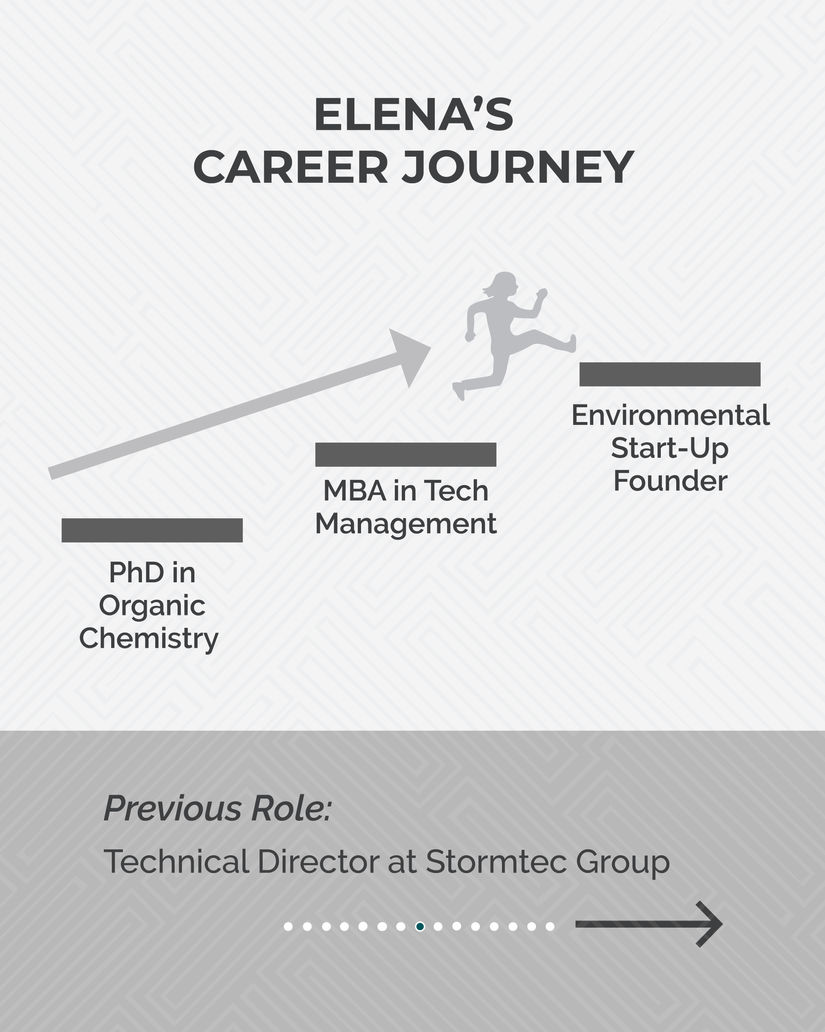Elena Ranyuk
An Entrepreneur in Technology & Innovation
What Do They Do?
Elena is the Co-Founder and CEO of Flowlink Environmental, a B.C. water tech startup that developed automated, real-time water effluent monitoring and control systems to prevent pollution during construction. Her innovation fills a critical gap in construction compliance by providing continuous, 24/7 water quality oversight on site - and taking action before pollutants reach the environment.
As CEO, Elena combines technical expertise with business leadership—overseeing scientific accuracy, managing operations, delivering training sessions, mentoring her team, and collaborating with partners and regulators to advance Flowlink’s mission.
Project Gallery
Why Does It Matter?
Flowlink’s technology shifts water management from reactive to proactive, helping prevent pollution and protect ecosystems. As development grows in BC, traditional compliance methods relying on manual checks and lab tests are too slow to catch problems before they cause harm. Flowlink provides real-time data and automated response, empowering construction teams to act before water pollution harms fish habitat and watershed health.
“My passion for environmental issues, coupled with hands-on experience in water treatment, helped me see a gap in the construction market. We built Flowlink to bring real-time control and intelligence into the field—where it can make the biggest impact.” — Elena Ranyuk
How Did They Get There?
PhD in Organic Chemistry, Lomonosov Moscow State University
MBA in Management of Technology, Simon Fraser University
Former Technical Director at Stormtec Group, where she led business development and process innovation in contaminated water treatment
Co-founded Flowlink Environmental in 2018 with a vision to transform water monitoring through smart, scalable innovation
Learnt how to blend technical excellence with entrepreneurial drive; navigating risks, managing a growing team and building tools that service real world needs.
Want To Follow A Similar Path?
Elena’s story is a powerful example of how entrepreneurs in water technology are driving real change in watershed health. If you’re curious about what this kind of role involves, how people enter the field, and why it’s so important, keep reading. The Career Spotlight below offers a closer look at what entrepreneurs like Elena do to innovate and protect our water resources.
What do Professional Agrologists do in Watersheds?
Professional Agrologists implementing riparian stewardship activities focus on restoring natural ecosystems and improving watershed health, especially in riparian zones along streams, rivers, and wetlands on agricultural land.
They work alongside, and often ahead of, restoration professionals by conducting detailed riparian health assessments. They evaluate the condition of the land and water systems and develop tailored prescriptions for restoration or management actions.
These recommendations are then discussed collaboratively with restoration professionals and agricultural landowners to create effective, locally informed plans that respect land use and integrate traditional knowledge. The restoration professionals then proceed to plant native species, stabilize eroding banks, and implement projects that enhance biodiversity, water quality, and climate resilience.
What's a Typical Pathway?
Most begin with a degree in environmental science, geography, agriculture, ecology, or biology. Many go on to earn their Professional Agrologist (P.Ag) designation through the BC Institute of Agrologists, which certifies their expertise and allows them to advise on land and water management practices.
Experience in fieldwork, habitat monitoring, or ecosystem assessment is common, often gained through volunteer, internship or employment opportunities with conservation groups, environmental agencies or consulting firms. Some are also trained through specialized training programs (e.g. Environmental Farm Plan Program).
Why Does This Matter?
Riparian areas are essential for healthy watersheds. The riparian area is the transitional zone of land between an aquatic ecosystem (like a stream, river, lake, or wetland) and a terrestrial (land) ecosystem. They support fish and wildlife, filter pollutants, and reduce flooding.
Professional Agrologists work with agricultural landowners to ensure that these areas remain strong and resilient, especially as climate change brings more extreme weather and pressures on the land.

Technology & Innovation
Career Spotlight
Profession: Water Tech Entrepreneur
What do Entrepreneurs do in Watersheds?
Entrepreneurs in water technology and innovation design and develop cutting-edge tools and systems that monitor, treat, and protect water resources in real time. Their work ranges from creating smart sensors and automated water treatment technologies to building data platforms that provide actionable insights for managing watershed health. These solutions are used by a wide range of stakeholders to detect pollution early, optimize water use, ensure regulatory compliance, and respond rapidly to environmental challenges. By leveraging technology, these entrepreneurs help transform traditional water management into a proactive, data-driven practice that safeguards ecosystems and supports sustainable development.
What's a Typical Pathway?
There is no one-size-fits-all path to becoming a water tech entrepreneur. Many founders begin with academic or professional backgrounds in fields such as environmental science, hydrology, engineering, software development, or chemistry. Hands-on experience working in water management, research, or environmental consulting often sparks ideas for innovative solutions. To bring these ideas to market, entrepreneurs commonly seek business skills through startup accelerators, incubators, mentorship programs, or formal education like MBAs or technology management courses. They learn to navigate product development, funding, market fit, and regulatory landscapes. Ultimately, success requires blending technical expertise with entrepreneurial agility to build scalable and impactful solutions.
Why does it Matter?
As pressures on watersheds increase, the need for innovative, responsive, and cost-effective water management tools has never been greater. Entrepreneurs in water technology are essential for bridging the gap between scientific research and practical application. They develop real-time, data-driven solutions that enhance monitoring, control, and treatment of water resources. These tools enable faster, smarter decision-making that protects aquatic ecosystems, safeguards public health, and supports economic growth. By closing gaps between technology and real-world needs, water tech entrepreneurs play a vital role in delivering timely solutions that secure resilient and sustainable water resources for the future.















